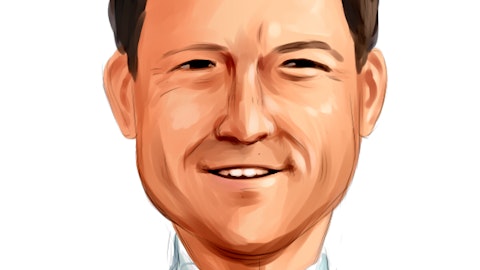Eric Spector: Hi, good morning everybody. This is Eric Spector on the line for David Feaster. I appreciate you guys taking the question. I just wanted to follow up on the deposit side. Obviously a lot of the outflows are primarily attributed to the Channel Islands you guys spoke to, and you alluded to it being activated for other investments. Just curious where you saw those deposits go. Do you lose those other banks or was it to the bond market or other investments? And what was the bond market, how much were you able to retain your trust in wealth management businesses?
Michael Schrum: So, I mean, as Michael mentioned, in Cayman and Bermuda, the deposit franchise have been relatively flat over the last, kind of month or so since the crisis. Again, in Channel Islands, we – the composition of the loan book is mainly corporates. So, it’s kind of other asset managers, obviously, always looking to manage their business and their asset yield. So, we did see them withdraw deposits and put that money to work essentially in their businesses and in other portfolio assets. And so again, kind of what we see as normal business flows have occurred in the Channel Islands.
Craig Bridgewater: Yes. So, I would just add to that. I mean, we weren’t getting commentary about credit sensitivity in the Channel Islands. It was sort of putting money to work. And if you remember, we bought ABM’s banking business in Guernsey and Deutsche Bank in Jersey. And those are institutional management company banks. So the longer-term – medium and longer-term plan is to start to move well into retail. So, we’ve got a couple of hundred million sterling mortgages. We’re taking sterling deposits now. We’re rolling out credit card shortly. So, we’re really going to become much more retail bank. So, the plan to fix the price sensitivity in the Channel Islands…
Operator: One second. I think the line we have dropped. Hello, can you hear us?
Eric Spector: I can still hear you, yes.
Operator: Okay. Sorry. Thank you.
Craig Bridgewater : So, the price sensitivity in the Channel Islands as a way to address that has obviously become more of a full-service retail bank, like Bermuda and Cayman with much less expensive funding. And we’re well on our way to do that. But this is – this was our first experience in the Channel Islands with that competitive environment with rates going up that quickly. So, it looked a little bit like other banks, but Bermuda and Cayman didn’t have any of that sensitivity at all. So, we are flat.
Eric Spector: Okay. And then just kind of going off that, the decline is coming from Channel Islands and that being the higher cost jurisdiction. I think we talked about 90% deposit betas. I guess would you just like – would you expect deposit betas to slow going forward? And would you expect to see continued NIM expansion and just as securities continue to reprice higher at a faster pace than deposits. Just curious if you have any color on betas and NIM going forward?
Michael Schrum: Yes. It’s Michael Schrum. So, I think specifically in the Channel Islands, I think we’re – we back tested obviously our betas and we’re fine with where they are, but it is a lot more competitive and it’s driving most of the deposit cost through the cycle, really. I think more broadly, as we think about NIM expansion in the current rate environment, we’re sort of nearing the end of that. We do have another 90-day lag loan repricing in Bermuda on the resi side still to come through, but the exit run rate for the quarter was , so pretty close to the average, really. And I think, yes, you’re right, we will likely see continued expansion from the short-term treasury liquidity book and also from rolling over the investment portfolio into higher-yielding securities. But any further loan NIM expansion is likely to, sort of be consumed offset by the higher deposit betas as we, kind of roll over the term deposits that we already have on the books.
Eric Spector: Yeah, appreciate the color. And then just wanted to touch on the loan side. You saw some declines this quarter. It’s pretty broad-based. Just curious your thoughts on the lending environment and growth. The decline in function of clients paying down higher cost debt or maybe less appetite given the uncertain environment? Any color there would be helpful.
Michael Schrum: Yes. I mean I think with everything that’s happening economically globally with inflation, I think people are pulling back a bit. I mean we see that in terms of construction projects may be cooling down a little bit in Cayman. If you look at Bermudan and Cayman, Bermuda’s GDP last year was 2022, was 3.5%, and the prediction is 2.5% for this year. Cayman was 4% last year and they’re looking at about 2.5% again. So, it is slowing down a bit, but we were just down in Cayman for an amateur golf event hosted by the PGA that we sponsor every year-end. And honestly, you couldn’t get a hotel room, the place is just booming. Bermuda, a little less, but again, I think the recovery from the pandemic in both places has been great.
But we’re really selective on the credit side. I mean we talk to all our people constantly about the fact that we don’t need to own every crane in Cayman and there’s a lot of projects going on. So, we see 10 to 15 and maybe we support one of them. So, we’re just very cautious and with treasuries, short-term treasuries where they are, there’s no need to reach for yield. So, some of it is pretty predictable at this stage.
Eric Spector: Yeah. Thank you taking the questions and I’ll step back.
Michael Schrum: Thank you.
Operator: Thank you. At this time there’s no further questions. We’ll turn the call back to management for closing remarks. Thank you.
Noah Fields: Well, thank you, and thanks to everyone for dialing in today. We look forward to speaking with you again next quarter. Have a great day.
Operator: Thank you. The conference is now concluded. Thank you for attending today’s presentation. You may now disconnect.
Follow Bank Of N.t. Butterfield & Son Ltd (NYSE:NTB)
Follow Bank Of N.t. Butterfield & Son Ltd (NYSE:NTB)
Receive real-time insider trading and news alerts





